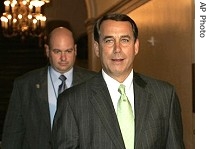-
(单词翻译:双击或拖选)
By Dan Robinson
Washington
17 November 2006
 House Republican Minority Leader John Boehner of Ohio arrives at US Capitol, Thursday, Nov. 16, 2006 |
||
-----
House Republicans faced a choice between two conservative lawmakers, one whose leadership skills have been tested for only 10 months and another who portrayed4 himself as an agent of change.
One of them is John Boehner, a 57-year-old Ohio lawmaker who won a hotly contested party election last February to replace former Majority Leader Tom DeLay, who stepped down while facing criminal charges in his home state of Texas.
Boehner's rise in the hierarchy5 had been slow and steady. He established a reputation as an able political operator and articulate spokesman for such key Republican policies as limited government and lower taxes.
He was challenged by Indiana Congressman6 Mike Pence, an outspoken7 fiscal8 conservative and leader of a group of Republicans who favor tighter control of spending.
But it is Boehner, by an overwhelming 168 to 27 vote, who will return to what will be the top post for Republicans in the minority.
He underscored the message of Republicans since they lost the House and the Senate to Democrats: namely that while much work remains9, retaking the majority in 2008, also a presidential election year, is within reach. "And to work hard so that we can earn our way back into the majority. And to do that means that we need to fight for a smaller, less-costly and more accountable federal government. But I think the key operative word here, is that we are going to work as a team, and we are going to earn our way back into our majority," he said.
Another familiar face in the present Republican majority leadership will return. Roy Blunt of Missouri won a tight contest with Arizona Congressman John Shadegg for the post of minority whip.
By retaining Boehner and Blunt, it appears a Republicans voted for stability over change, despite calls from factions10 within the party and conservative spokesmen and commentators11 for new faces to challenge Democrats.
Since the election, many Republicans have asserted that Americans did not reject conservative values, only Republican failures to stick to and efficiently12 implement13 their agenda. Blunt says they have learned from mistakes. "Frankly14, to get rid of the bad habits that we may have developed in 12 years in the majority. It is not our job to defend business as usual, not our job to try to define the federal government in the biggest possible way. We need to do the right things. Our conference is ready to do that," he said.
In a separate written statement, Blunt launched a blast at the future Democratic leadership, and incoming House Speaker Nancy Pelosi in particular, saying Republicans will "give Democrats a viable15 alternative [to Pelosi's] liberal, San Francisco agenda."
In Friday's news conference, Boehner stood firm firmly by President Bush on the issue of Iraq. "Republicans in the Congress want to win in Iraq. I think the president wants to win in Iraq, and most importantly I think the American people want to win in Iraq," he said.
Conspicuously16 absent from the first Republican leadership news conference was House Speaker Dennis Hastert, who, while re-elected to Congress from his district in Illinois, decided17 not to pursue a leadership post.
Hastert's final months as speaker were marked by pressure on him and other key Republicans from a congressional and federal probe into inappropriate contacts and e-mail by a former Republican lawmaker Mark Foley with teenage congressional interns18.
Senate Republicans chose their leaders earlier this week, with Kentucky Senator Mitch McConnell set to become the future minority leader, and Mississippi's Trent Lott making a political comeback in the number two post.
With future House and Senate majority and minority leaderships set, both parties still need to get through the transitional "lame19 duck" session, facing the reality of unfinished work such as major appropriations20 bills required to keep the government running.
Lawmakers return to work for that in the first week of December, aiming if possible to bring the 109th Congress to a formal close no later than the middle of the month.
 收听单词发音
收听单词发音
1
unity

|
|
| n.团结,联合,统一;和睦,协调 | |
参考例句: |
|
|
|
2
vowing

|
|
| 起誓,发誓(vow的现在分词形式) | |
参考例句: |
|
|
|
3
democrats

|
|
| n.民主主义者,民主人士( democrat的名词复数 ) | |
参考例句: |
|
|
|
4
portrayed

|
|
| v.画像( portray的过去式和过去分词 );描述;描绘;描画 | |
参考例句: |
|
|
|
5
hierarchy

|
|
| n.等级制度;统治集团,领导层 | |
参考例句: |
|
|
|
6
Congressman

|
|
| n.(美)国会议员 | |
参考例句: |
|
|
|
7
outspoken

|
|
| adj.直言无讳的,坦率的,坦白无隐的 | |
参考例句: |
|
|
|
8
fiscal

|
|
| adj.财政的,会计的,国库的,国库岁入的 | |
参考例句: |
|
|
|
9
remains

|
|
| n.剩余物,残留物;遗体,遗迹 | |
参考例句: |
|
|
|
10
factions

|
|
| 组织中的小派别,派系( faction的名词复数 ) | |
参考例句: |
|
|
|
11
commentators

|
|
| n.评论员( commentator的名词复数 );时事评论员;注释者;实况广播员 | |
参考例句: |
|
|
|
12
efficiently

|
|
| adv.高效率地,有能力地 | |
参考例句: |
|
|
|
13
implement

|
|
| n.(pl.)工具,器具;vt.实行,实施,执行 | |
参考例句: |
|
|
|
14
frankly

|
|
| adv.坦白地,直率地;坦率地说 | |
参考例句: |
|
|
|
15
viable

|
|
| adj.可行的,切实可行的,能活下去的 | |
参考例句: |
|
|
|
16
conspicuously

|
|
| ad.明显地,惹人注目地 | |
参考例句: |
|
|
|
17
decided

|
|
| adj.决定了的,坚决的;明显的,明确的 | |
参考例句: |
|
|
|
18
interns

|
|
| n.住院实习医生( intern的名词复数 )v.拘留,关押( intern的第三人称单数 ) | |
参考例句: |
|
|
|
19
lame

|
|
| adj.跛的,(辩解、论据等)无说服力的 | |
参考例句: |
|
|
|
20
appropriations

|
|
| n.挪用(appropriation的复数形式) | |
参考例句: |
|
|
|















